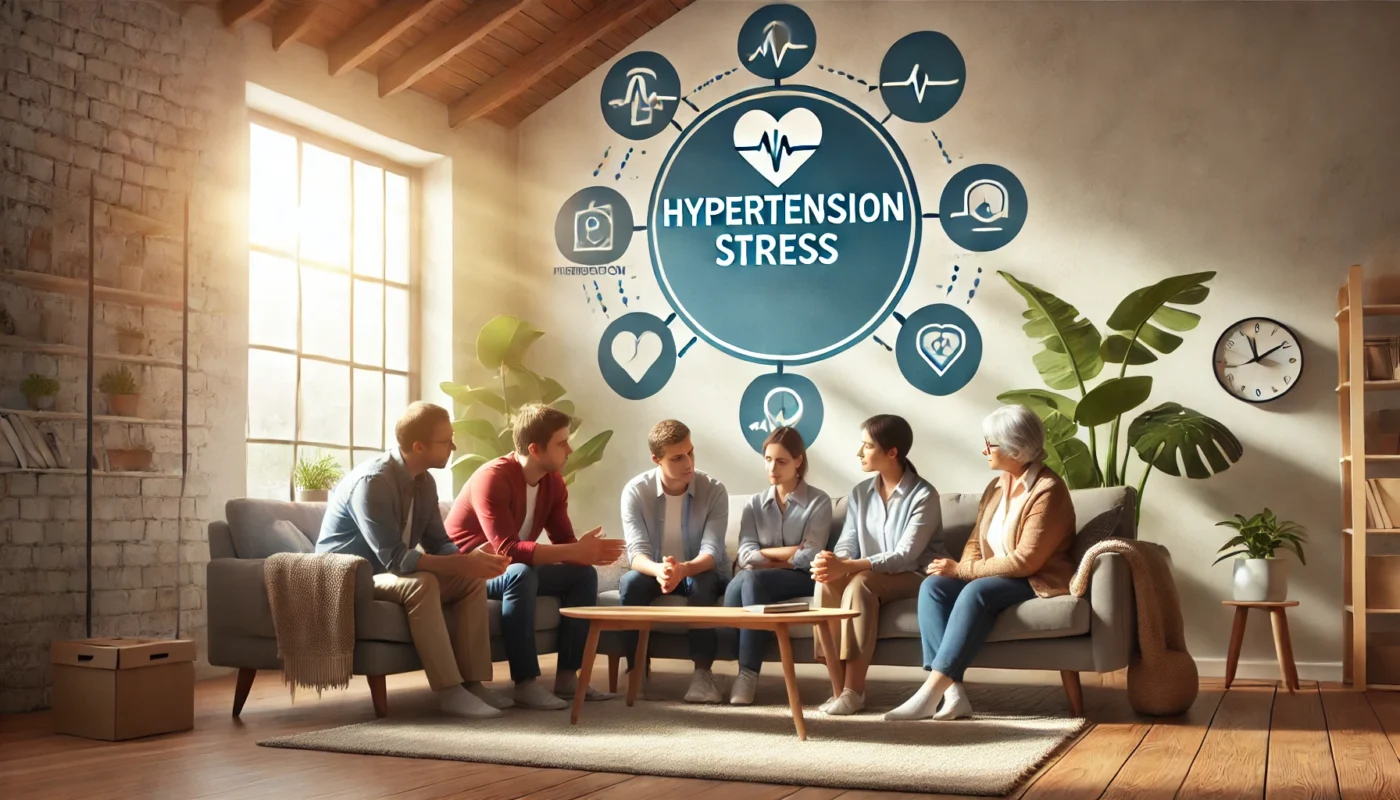Hypertension, or high blood pressure, is often referred to as the “silent killer” due to its asymptomatic nature and severe long-term consequences, such as heart disease, stroke, and kidney failure. However, the impact of hypertension extends beyond physical health. Living with a chronic condition like hypertension can lead to significant emotional stress, including anxiety, depression, and feelings of isolation. This stress can, in turn, worsen blood pressure control, creating a vicious cycle. Support groups provide an effective solution, offering a safe space for individuals to share experiences, gain knowledge, and develop emotional resilience. This article explores how support groups help alleviate the psychological burden of hypertension, the science behind their benefits, and strategies for finding or creating the right group.
You May Also Like: Zinc Picolinate for Oral Health: Strengthening Teeth and Gums
The Psychological Impact of Hypertension
Living with hypertension often brings with it an array of emotional challenges. The constant worry about complications, the pressure to maintain lifestyle changes, and the fear of an uncertain future can weigh heavily on individuals. These psychological burdens can activate the body’s stress-response systems, leading to an increase in blood pressure.
Stress and Hypertension: A Two-Way Relationship
Stress plays a significant role in both the development and progression of hypertension. When the body experiences stress, it activates the sympathetic nervous system, releasing hormones such as cortisol and adrenaline. These hormones increase heart rate and constrict blood vessels, causing blood pressure to rise. Chronic stress keeps this response activated, contributing to sustained hypertension.
On the flip side, living with hypertension can be a source of ongoing stress. The need to manage medications, adhere to strict dietary guidelines, and navigate social situations that might conflict with health goals can create feelings of frustration and isolation. A study published in The Journal of Hypertension (2018) found that individuals with poorly controlled blood pressure reported higher levels of psychological distress than those with well-managed hypertension.

How Support Groups Help in Managing Hypertension Stress
Emotional Support and Validation
Support groups provide a sense of belonging and validation by connecting individuals who share similar challenges. Discussing personal experiences in a non-judgmental environment can reduce feelings of isolation and help participants realize they are not alone in their journey.
A study in Psychosomatic Medicine (2019) found that individuals who regularly attended support groups experienced a 20% reduction in stress-related symptoms, including anxiety and depression, compared to those who managed hypertension without social support. This reduction in stress was linked to better blood pressure control.
Stress Reduction Through Shared Knowledge
Many support groups include an educational component, offering information on effective hypertension management strategies. This knowledge empowers participants to make informed decisions about their health, reducing the anxiety associated with uncertainty. Topics might include:
- Understanding medications and their side effects.
- Adopting heart-healthy dietary habits, such as the DASH diet.
- Incorporating physical activity into daily routines.
- Managing stress through relaxation techniques.
Education provided in a supportive environment can transform daunting lifestyle changes into manageable steps, alleviating the stress associated with hypertension care.
Accountability and Motivation
Support groups foster a sense of accountability among members. Setting goals—such as reducing sodium intake, increasing physical activity, or adhering to medication schedules—becomes more achievable when individuals feel supported and encouraged by their peers. Positive reinforcement from group members can motivate participants to stick to their health goals, ultimately improving blood pressure outcomes.
A randomized trial in The American Journal of Hypertension (2020) demonstrated that individuals participating in group-based hypertension interventions had a 10 mmHg greater reduction in systolic blood pressure compared to those who received standard care alone. The study highlighted the importance of shared motivation and accountability in achieving better health outcomes.
Coping with Emotional Challenges
Hypertension often coexists with conditions such as anxiety and depression, which can complicate management. Support groups address the emotional dimensions of living with hypertension by providing coping strategies for dealing with fear, frustration, and setbacks. Techniques such as mindfulness, guided imagery, and progressive muscle relaxation are frequently discussed and practiced within groups, equipping members with tools to manage their emotional health.

The Science Behind Support Groups and Blood Pressure Control
The benefits of support groups are supported by scientific evidence linking social support to improved cardiovascular health. Social connectedness has been shown to reduce stress, lower blood pressure, and improve adherence to treatment plans.
Reduced Sympathetic Nervous System Activation
The presence of strong social support dampens the body’s stress response, reducing sympathetic nervous system activity. This leads to lower levels of stress hormones such as cortisol and adrenaline, which helps stabilize blood pressure. A study in Circulation (2018) found that individuals with strong social networks had significantly lower blood pressure levels and reduced risk of hypertension-related complications.
Enhanced Emotional Resilience
Support groups build emotional resilience by fostering a sense of empowerment and self-efficacy. Participants learn to reframe challenges, view setbacks as temporary, and approach their condition with a problem-solving mindset. This resilience reduces the emotional burden of hypertension, allowing individuals to focus on long-term health goals.
Finding or Creating a Hypertension Support Group
Local and Online Options
Support groups can be found in a variety of settings, including hospitals, community centers, and online platforms. Local groups often provide face-to-face interactions, which many individuals find more personal and engaging. Online groups, on the other hand, offer flexibility and accessibility, allowing participants to connect from the comfort of their homes.
To find a support group:
- Ask your healthcare provider for recommendations.
- Search for local groups through hospital websites or community health organizations.
- Explore online platforms like Facebook, Meetup, or health-specific forums.
Starting Your Own Group
If a suitable group is not available in your area, consider starting one. Here are some tips for creating an effective support group:
- Define the Purpose: Clearly outline the group’s goals, whether it’s emotional support, education, or both.
- Identify a Venue: Choose a location that is convenient, comfortable, and accessible. For online groups, platforms like Zoom or Google Meet work well.
- Advertise: Spread the word through healthcare providers, community centers, and social media.
- Facilitate Discussions: Use open-ended questions to encourage participation and ensure all members feel heard and valued.
- Bring in Experts: Occasionally invite healthcare professionals to provide insights on hypertension management.

Nutritional Supplements to Support Hypertension and Emotional Resilience
Support groups often discuss complementary strategies for managing hypertension, including the role of nutritional supplements. Here are five evidence-based supplements that can support both blood pressure control and emotional well-being:
- Magnesium Glycinate
Magnesium promotes vascular relaxation and reduces stress-induced blood pressure spikes. A study in Magnesium Research (2016) found that magnesium supplementation reduced systolic blood pressure by 5 mmHg and improved mood stability. - Omega-3 Fatty Acids
Omega-3s reduce inflammation, improve endothelial function, and support mental health.A meta-analysis in Hypertension (2018) demonstrated that omega-3 supplementation lowered systolic blood pressure by 4 mmHg. - Ashwagandha
This adaptogenic herb reduces cortisol levels and enhances emotional resilience, benefiting both stress management and blood pressure control. Research in The Journal of Clinical Medicine (2020) found significant reductions in stress and blood pressure with ashwagandha supplementation. - Coenzyme Q10 (CoQ10)
CoQ10 supports mitochondrial function and reduces oxidative stress, improving cardiovascular health. A study in Hypertension Research (2007) showed CoQ10 supplementation reduced systolic blood pressure by 11 mmHg and diastolic blood pressure by 7 mmHg. - Hibiscus Extract
Hibiscus tea promotes nitric oxide production, enhancing vascular relaxation and lowering blood pressure. Research in The Journal of Nutrition (2010) found that hibiscus tea reduced systolic blood pressure by 6 mmHg in prehypertensive individuals.
Conclusion
Managing the emotional burden of hypertension is as important as addressing its physical symptoms. Support groups provide an invaluable resource for individuals coping with the challenges of high blood pressure by offering emotional support, knowledge, and motivation. The scientific evidence clearly demonstrates that social connectedness reduces stress, enhances emotional resilience, and improves blood pressure control. Whether through local meetups or online communities, joining a support group can empower individuals to navigate the complexities of hypertension with confidence and hope. By combining social support with evidence-based strategies, including lifestyle changes and nutritional supplements, individuals can take meaningful steps toward better heart health and overall well-being.

References
- Current Hypertension Reports. (2020). The impact of emotional resilience in managing hypertension. Current Hypertension Reports.
- The Journal of Clinical Hypertension. (2021). Social support networks and adherence to hypertension treatment. The Journal of Clinical Hypertension.
- Hypertension Research. (2007). Coenzyme Q10 and blood pressure reduction. Hypertension Research.
Important Note: The information contained in this article is for general informational purposes only, and should not be construed as health or medical advice, nor is it intended to diagnose, prevent, treat, or cure any disease or health condition. Before embarking on any diet, fitness regimen, or program of nutritional supplementation, it is advisable to consult your healthcare professional in order to determine its safety and probable efficacy in terms of your individual state of health.
Regarding Nutritional Supplements Or Other Non-Prescription Health Products: If any nutritional supplements or other non-prescription health products are mentioned in the foregoing article, any claims or statements made about them have not been evaluated by the U.S. Food and Drug Administration, and such nutritional supplements or other health products are not intended to diagnose, treat, cure, or prevent any disease.

